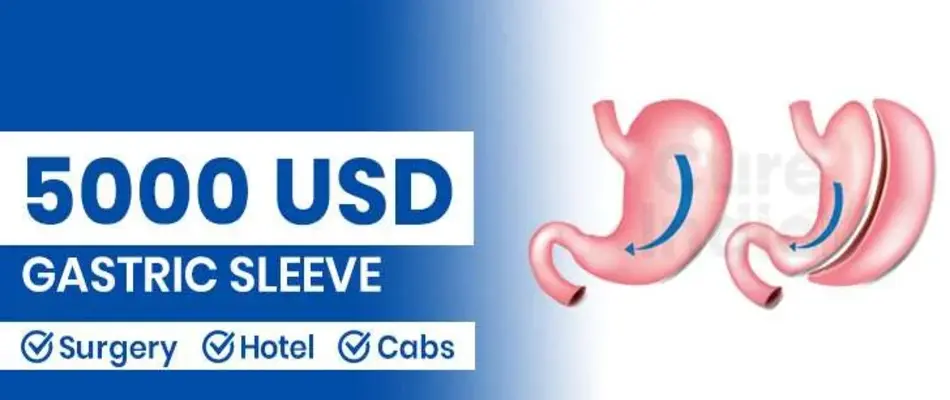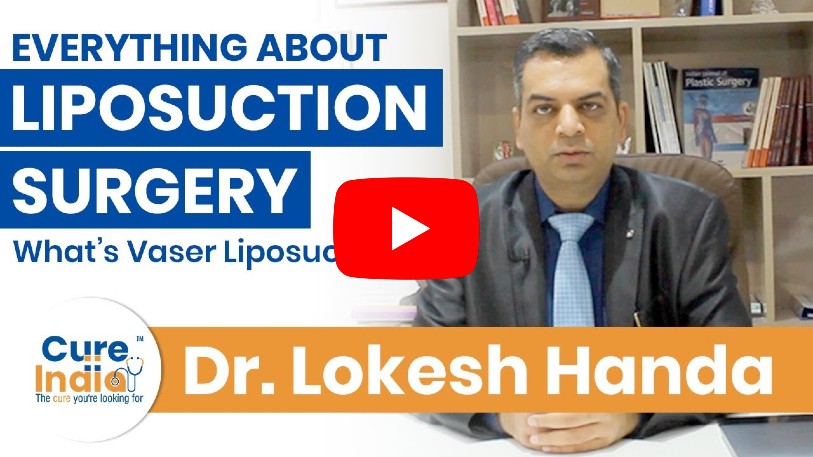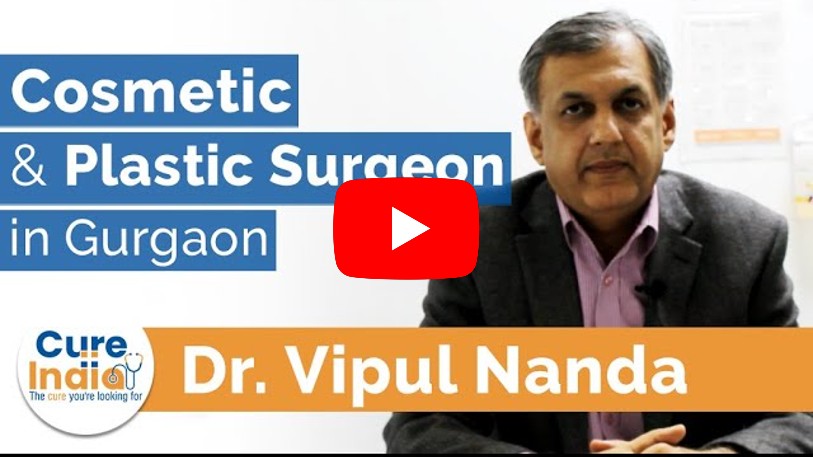

Gastric sleeve surgery helps to reshape your stomach which leads to weight loss. In the last 5 years, the number of sleeve gastrectomy has been increasing in the USA. Below is a comprehensive guide to planning gastric sleeve surgery at a reasonable cost.
.png)
Are you thinking about having gastric sleeve surgery because you've tried diets and exercise for years and still can't seem to lose weight? Then the Gastric sleeve cost in India will definitely make you do it.
During this procedure, doctors remove a section of your stomach and put the remaining portions together to form a new "sleeve”. You'll feel full a lot faster than you did before with just a little sack (approximately 1/10th the size of your natural stomach). You won't be able to consume as much food as you used to, which will aid in weight loss. If you want gastric sleeve surgery on a low budget then medical tourism is the best option for you. Indian healthcare infrastructure is now one of the largest in the world and boasts of 39 JCI and 300 NABH accredited hospitals.
The gastric sleeve cost in India is low in comparison to many countries. Apart from prices, we also offer better treatment and post-operative care with many additional benefits. Keep reading to know the Gastric sleeve cost.
What is the Gastric Sleeve Cost? The Gastric sleeve surgery cost is very less in India.
Excess weight has many physical effects, including type 2 diabetes, an increased risk of falling, heart problems, and osteoarthritis. However, its impact on our mental and emotional wellness receives less attention. Obese people frequently suffer from mental and anxiety disorders in addition to their physical challenges.
Lose Weight and feel great! Many people have no exact idea how much a gastric sleeve costs at CureIndia, and they think it is expensive. Well, it’s not the case. Consider the cost of a gastric sleeve in India versus the United States.
| Procedure | Cost in USA | Cost in India | Cost Savings |
|---|---|---|---|
| Gastric Sleeve | $9,000 - $18,000 | $5,000 | 72% |
Contact us at +91 8448560641 or fill in the inquiry form to know more about the package.
In India, the quality of this surgery’s diagnosis, treatment, and preventative health care at a lesser Gastric bypass cost is comparable to that of the world's best hospitals. Apart from this, CureIndia offers you a set of complimentary services.
Apart from low treatment prices, India has world-class facilities with cutting-edge technology and highly qualified doctors, which encourages individuals from all over the world to seek treatment there. Not only does India have the best doctors, but it also offers the best medical facilities at affordable pricing.
We have internationally trained and board-certified cosmetic and plastic surgeons with a wealth of experience in the field. Our internationally trained surgeons have one goal in mind: to make you "look your best and feel pleased”. Here are some of the skilled and experienced doctors in India.



Gastric sleeve is a bariatric surgical procedure that minimizes the size of your stomach. In many cases, health insurance companies cover all or a portion of bariatric surgery under certain conditions.
Gastric sleeve surgery is typically a weight loss surgery. Hence, you must pass specific criteria to cover your gastric sleeve cost. If you wish to lose weight by reducing the size of your stomach, your insurance company may decide to stay away from covering your treatment.
But, there is a condition where your claims will be granted. You must prove to your health insurance company that a gastric sleeve is necessary for good health. The cost of a gastric sleeve surgery will be covered if you have severe health conditions like cardiovascular complications and apnea due to heavyweight. But in that case, you must prove to them that you cannot lose weight naturally through diet and exercise. Even alternative medical techniques were of no help in reducing your extra pounds.
Gather all the documents and reports of your test results, related photographs, prescriptions, and doctor’s remarks in support of your insurance claim. Moreover, you will have to tick off all the criteria of the terms and policies of your health insurance company. Only then can you get insurance coverage for your gastric sleeve surgery.
Please talk to your surgeon first about the treatment and then visit your insurer. Go through their terms and conditions carefully and then present your conditions. In many cases, they approve insurance requests.
Gastric sleeve surgery is a form of weight-loss surgery. During gastric sleeve surgery, a surgeon removes a portion of the stomach and creates a narrow tube, or "sleeve," from the remainder. The new, banana-shaped stomach is significantly smaller than the original. A section of the stomach that has been removed produces hormones that increase appetite and aid in insulin control. As a result, after surgery, a person's appetite decreases, and their insulin resistance improves. In India, there are well-experienced and qualified weight loss surgery surgeons who have extensive knowledge that allows them to determine the cause of the weight gain and plan appropriate treatment. The surgeon will help you decide on lap band vs. gastric sleeve-choosing the right procedure for you. Weight loss surgery surgeons collaborate with both medical and non-medical staff in the hospital to provide patients with international standards of care. The cost of Gastric Sleeve Surgery is also less than in other countries. So, you can easily opt for it.
These hospitals also have world-class infrastructure, which provides a comfortable environment for their patients. The best hospitals in India for weight loss surgery are well-equipped with cutting-edge medical technology. These hospitals have well-trained and experienced nursing staff who can provide excellent care to patients.
India is the preferred destination for foreign patients seeking weight loss surgery because Indian doctors and surgeons provide the best and most comprehensive care to their patients. Furthermore, many hospitals in India are well equipped with the latest medical devices, and with their use, weight loss surgery can be performed easily and at a lower cost than compared in other countries.
Severe obesity is treated with gastric sleeve surgery. It is recommended for people who have tried other weight loss methods and have not had long-term success. If you are severely obese and have a BMI of more than 40, your doctor may recommend gastric sleeve surgery. If you have a BMI between 35 and 40 and a health condition such as sleep apnea, high blood pressure, heart disease, or type 2 diabetes, your doctor may also recommend it. Another important factor is psychological readiness. Gastric sleeve surgery necessitates a series of drastic lifestyle changes that can be stressful or result in unexpected reactions. As a result, having the proper attitude toward food, exercise, and health is critical.
How much weight you are going to lose after your gastric sleeve entirely depends on you. Generally, people lose nearly 50% to 70 % of their excess weight in the first 6 months. But one has to follow the strict instructions of their surgeon to achieve that.
Gastric sleeve surgery, unlike many surgeries, is an immediate reaction surgery. That is to say; you will notice results right from the day after your weight-reducing procedure. However, the rate of losing weight depends on many factors. Your initial body weight, body mass index, gender, age, overall health condition, and daily routine decide your weight loss rate.
After your gastric sleeve, your surgeon will customize a specific dietary routine for your fast weight loss. You will have to stick to that until you reach your desired goal. You may have to go on a completely liquid diet for at least one month. Your surgeon will guide you accordingly.
Please remember that you will lose nearly 25% to 30% of your entire body weight, that is, almost 70% of excess pounds in the first 6 months. Hence, you must take good care of your health during recovery.
Laparoscopy will be performed by your surgeon for the gastric sleeve. Laparoscopic sleeve gastrectomy is a restrictive procedure that does not include the malabsorptive component found in other bariatric procedures. It entails removing two-thirds of the stomach in order to increase satiety and decrease appetite. The intragastric volume is less able to accommodate a large volume of food due to stomach size restriction, resulting in decreased food consumption. Furthermore, a lower volume of food causes earlier distention of the stomach, resulting in the activation of stretch receptors in the gastric wall. These signals are transmitted via the vagus nerve to the nucleus of the solitary tract in the brainstem, which then transmits them to the hypothalamus and then to the cerebral cortex, resulting in the sensation of satiety. Reduced ghrelin levels caused by resection of the gastric fundus, the site of ghrelin production, are also likely to lead to increased satiety.
The basic steps involve the following:
One of the most important pre-surgery goals is to reduce the size of your liver. If you're overweight, your liver is likely to have an accumulation of fat cells both inside and outside of it. As a result, it is larger than it should be. The liver is located next to the stomach. A large liver makes gastric sleeve surgery more difficult for your doctor to perform and more dangerous for you to undergo. You will be given a diet to follow in order to prepare for the procedure. It's a strict diet that restricts calories as well as carbs like sweets, potatoes, and pasta. You'll mostly consume lean protein, vegetables, and low- or no-calorie fluids.
1). Smoking and alcohol cessation is required before surgery.
2). We recommend that you bring only the necessities to the hospital like
i) Strips for reducing gas in the intestine
ii) Include some soft slippers.
iii) Bring all of the medications you normally use at home.
iv) Clothing that is comfortable
v) Earrings, jewelry, and the like should be avoided, but if you must wear them, we recommend that you remove them before surgery.
vi) Before your surgery, you must discontinue the use of blood-thinning medications.
vii) If your doctor advises you, you should not eat or drink anything before surgery.
1). Your surgery will be performed while you are sedated. As a result, you will nod off during the procedure.
2). Laparoscopy will be performed by your surgeon. In your upper abdomen, he or she will make several small cuts (incisions). The surgeon will then insert a laparoscope and small surgical instruments into the incisions.
3). The anesthesiologist will then insert a sizing tube into your stomach through your mouth. The surgeon will then divide the stomach with a laparoscopic stapler, leaving a narrowed vertical sleeve. The removed portion of the stomach is then extracted from the abdomen via an incision. Your surgeon may then go for a dye study or an upper endoscopy to look for any leaks in the sleeve.
4). Surgery mostly gets completed in one to two hours of time. You awaken in a recovery room after surgery, where medical staff monitors you for any complications.
After gastric sleeve
5). Over the next few weeks, your surgery team will provide you with a meal schedule. You'll progress from a liquid diet to pureed foods, soft foods, and finally regular food. Each meal must be extremely small. Don't rush back to regular food. This can result in pain and vomiting. Work with your healthcare team to determine what foods are best for you. You will need to change your eating habits after your stomach heals. Because of your small stomach, you'll need to eat small meals.
6). For the rest of your life, you'll have to take a multivitamin twice a day, a calcium supplement once a day, and a vitamin B-12 injection once a month.
7). Before swallowing, everything must be thoroughly chewed.
8). Drinking while eating should be avoided as it may cause your new stomach to overfill.
9). Snacks and high-calorie sodas should be avoided.
10). Most people stay in the hospital for 2 to 3 days and get back to normal activities in 5 to 10 weeks.
The cost of gastric sleeve surgery in India is comparatively lower without sacrificing the surgery's quality or precision. India is fortunate to have a highly skilled and experienced team of surgeons who are adept at handling critical cases with great success.
As a big part of your stomach will be removed, you will have to pay full attention to your dietary changes. You cannot start eating normally like you used to do before your gastric sleeve. You will get a personalized gastric sleeve diet from your surgeon.
Now, you will feel full quickly because most of your stomach is gone. So, it will not be difficult to adjust to the new routine. Initially, you will start with water. Then for the following 3 to 4 weeks, you will have to depend on a liquid diet.
After a month, your stomach will be in a condition to afford pureed food, and following that, after 5 to 6 weeks, you can resume your regular diet. Please keep in mind that you will have to maintain 800 calories at first. Increase the limit gradually, and after 6 months, you can intake 1500 calories. You can eat normally after 6 months. But try to avoid high-calorie foods. Also, stay away from high-fat food items.
1). You can reach out to us by one of the following methods:-
a) Tapping the WhatsApp button blinking on the website. Or connect manually at +91 8448560641
b) Drop an email to us at support@cureindia.com
c) Call our international helpline +91 9555887700
d) Leave an by filling an enquiry form on our website
2). As soon as you reach us, our case manager will get back to you within 24 hours. We gather your requirements and clinical images(if needed), and discuss them with our cosmetic surgeons. We will get back to you with a cost estimate and treatment plan.
3). We book your appointment as per your travel schedule and make all necessary arrangements.
4). We pick you up at the New Delhi Airport on the day of your arrival, and the medical travel process starts.


Tummy Tuck, Breast lifts and Rhinoplasty
Be The New You
Female Only Clinics for Sensitive Patients
Full Privacy
Dermal Fillers, Laser, Anti Wrinkle Injections
Say No To Ageing